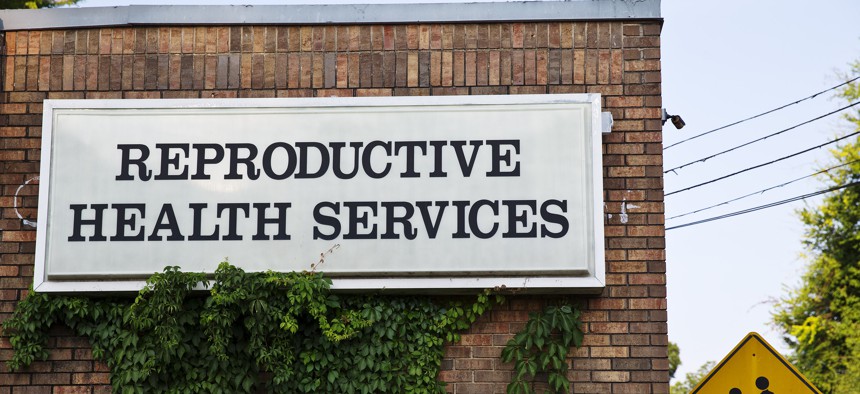Judges Take Up Abortion Bans Put in Place During Coronavirus Pandemic

An abortion clinic in Montgomery, Alabama. A federal judge ruled that the state cannot ban abortion during the pandemic. AP Photo/Brynn Anderson

Connecting state and local government leaders
Federal judges on Monday blocked Texas, Ohio, and Alabama from forcing abortion clinics to close. A day later, a federal appeals court panel temporarily reinstated the Texas limits.
As of Monday, officials in 32 states have made efforts to limit or halt all elective medical procedures in an effort to reduce the use of limited personal protective equipment for doctors and nurses, as well as clear up space in hospitals and ambulatory surgical centers. In at least eight of those states, officials said these restrictions also applied to abortion clinics, a directive that has set off legal battles across the country.
State officials of the coronavirus-inspired limits on abortion say that “nonessential” procedures should be postponed so that medical resources can be directed towards combating the virus. “No one is exempt from the governor’s executive order on medically unnecessary surgeries and procedures, including abortion providers,” read a statement from Texas Attorney General Ken Paxton issued last week. “Those who violate the governor’s order will be met with the full force of the law.”
But reproductive rights activists have argued it is a fundamentally flawed to categorize abortions as “elective,” as in most states they can only be performed for a certain time during a pregnancy. A coalition of groups led by Planned Parenthood challenged the state orders in Texas, Ohio, and Alabama in an attempt to keep clinic doors open. On Monday, federal judges in all three states granted temporary restraining orders against the closures until mid-April.
But then on Tuesday, a 5th U.S. Circuit Court of Appeals panel in a 2-1 ruling issued its own temporary stay of the Texas decision, setting out a timetable for lawyers to submit filings that makes another ruling unlikely until next week.
In his now-stayed decision delivered on Monday, U.S. District Judge Lee Yeakel in Texas wrote that the Supreme Court has been clear about the kind of restrictions constitutionally allowed on abortion. “Regarding a woman's right to a pre-fetal-viability abortion, the Supreme Court has spoken clearly. There can be no outright ban on such a procedure,” Yeakel wrote. “This court will not speculate on whether the Supreme Court included a silent ‘except-in-a-national-emergency clause’ in its previous writings on the issue.”
Yeakel also pushed back Paxton’s claim that abortion clinics were "withholding desperately needed supplies” from hospitals, writing that "the benefits of a limited potential reduction in the use of some personal protective equipment by abortion providers is outweighed by the harm of eliminating abortion access in the midst of a pandemic.” He also noted that, if a ban on almost all abortions were put in place—the procedure would still be allowed to save the life of the mother—some women might decide to travel to other states to access abortion care, a risky move at a time when more states and localities are issuing stay-at-home orders.
Judges in Ohio and Alabama similarly wrote that prohibiting abortions would “inflict irreparable harm” because time limits on the procedure in these states would “fully prevent some women from exercising their right to obtain an abortion.”
Paxton said he was "deeply disappointed” in the ruling and that his office is “seeking prompt appellate review to ensure that medical professionals on the frontlines have the supplies and protective gear they desperately need.” On Tuesday, after the 5th Circuit stay, he celebrated the order as "a victory" on Twitter.
Abortion clinics in many states have pledged to keep their doors open no matter what, with leaders arguing that the procedure is not elective because it can not be safely postponed. Delayed abortions can negatively impact the health of the mother and then become impossible to get if a pregnancy passes the gestational age limit a state has in place, providers say.
Most governors have not issued direct guidance as to whether abortion is considered an essential or nonessential medical service, essentially allowing clinics to remain open. Governors in Massachusetts, Minnesota, Illinois, New Jersey, and Washington have specifically clarified that elective surgery bans do not impact reproductive health services.
Abortion providers say that their services are safe to access during the pandemic. Dr. Krishna Upadhya, the senior medical advisor at Planned Parenthood, said that the health of patients and staff is the top priority, and that health centers are “taking extra precautions” like moving seats in the waiting room farther apart and staggering appointment times. “Amid the ongoing outbreak of COVID-19, our elected leaders from the top down should be focused on ways to combat this public health crisis,” Upadhya said in an email to Route Fifty. “Instead, we are seeing several states waste valuable time and energy prioritizing ways to take away access to our most basic rights and freedoms.”
On Monday, Planned Parenthood and several other abortion rights organizations filed lawsuits in Oklahoma and Iowa, two other states with crisis directives to stop abortions unless they are necessary to save the life of the mother. Indiana and Kentucky ordered reproductive health clinics to shut down on Monday, and Mississippi issued a similar ban last week, but no suits have been filed in those states yet.
OTHER STORIES on Route Fifty:

NEXT STORY: States, Hospitals Grapple With Medical Rationing





